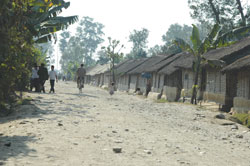|
|
| LONG ROAD HOME:Over 100 thousand Bhutani refugees have been living in the camps in Jhapa for over a decade. |
No school bus stops here to pick up children. No postman comes here to deliver mail. They are refugees from Bhutan who were sitting for more than a month in front of the United Nations in Kathmandu.
The UN gives most of them two square meals a day back at their camps in Jhapa, but compassion fatigue is setting in. "That is the maximum we can do," says UNHCR representative Abraham Abraham, "it is, however, criminal to keep them in camps for so long."
The camps have become a base for pro-democracy dissent activity against the Bhutani establishment. The refugees are not radicals. They have never questioned their monarchy, even though their host country might have. But they want to have a future.
It was not any green pasture which attracted them. They were forced to leave their lands and homes. The royal government of Bhutan found them too insistent on the question of democracy and human rights, too restive against laws on language and national dress. They still want to go back to the same setup, confident to overcome the difficulties in Bhutan and work for the country's development. But neither Bhutan, nor any foreign nation, seems bothered about their future.
After deadlocked bilateral negotiations, the Americans have volunteered to absorb 60,000 of them in the US. The proposal has got mixed responses. Many Bhutani refugee leaders feel that while the offer was welcome, the US should have been exerting pressure on Bhutan to take back its people. Others feel that the proposal is not a long-term solution and could, in fact, act as a destabilising factor within Bhutan and among the refugees.
US ambassador James F Moriarity argues that it is a human problem which required immediate attention. He didn't react to the plea to remonstrate with Bhutan except to say: "We are in touch with India."
New Delhi should have been more proactive. An authoritarian regime which is solely dependent on it for defence should have been pressured to get refugees back to their homes. But New Delhi is afraid to even ask questions lest tiny Bhutan should be annoyed and tilt towards the next door China.
Bhutan sealed its border in 1950 when the Tibetans were running away for refuge. It can't afford to lean on China. But diplomatically and economically, India and Bhutan are close to each other and that is what makes New Delhi's leverage important. The people or organisations with which I interacted in Kathmandu recently expressed an urgent need for India to take an active role in resolving the refugee issue.
With its tradition of multi-party democracy, its pluralistic society and its role as a leading economic power in the region, India is seen as the only entity which could and should try to seek a solution to this humanitarian crisis. Bhutani refugee leader Teknath Rizal says he is convinced New Delhi will not step in to help. His own experience was not a happy one. When he got to the border after being released from detention in Bhutan, he was jailed and given a choice leave India or spend the rest of his life in jail. He preferred to travel to Nepal because it allowed him to live freely and propagate the cause of refugees.
A report by South Asian Human Rights Forum has put the whole thing in perspective: "A major human rights deficit in the South Asian region is the prolonged exile of Bhutanese refugees living in Nepal and India. Both host governments have often ruthlessly cooperated with the Bhutanese government in forced repatriation, arrest or denial of freedom of association and expression to the refugees. This tri-governmental alliance has demobilised the Bhutanese refugee population. Their visibility is low and all attempted solutions lack coherence."
One of the consequences of allowing the problem to fester is the possibility that dissatisfaction and unrest among refugees could overtime drive them to extremism. This could create new conflicts in the region and India could experience negative fallout.




